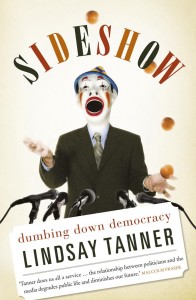Review: The Hunger Games Trilogy


 When a new fad of fiction hits the popular mind I make a habit of engaging with it. Twelve years ago I did it when Harry Potter arced up. More recently I engaged with Twilight (where by “engage” I mean forcing myself to complete the first book). After all, its from this sort of phenomenon that common metaphors and other tools of communication evolve, and they are useful.
When a new fad of fiction hits the popular mind I make a habit of engaging with it. Twelve years ago I did it when Harry Potter arced up. More recently I engaged with Twilight (where by “engage” I mean forcing myself to complete the first book). After all, its from this sort of phenomenon that common metaphors and other tools of communication evolve, and they are useful.
And so I read The Hunger Games trilogy by Suzanne Collins. And I thoroughly enjoyed it. In and of itself its a decent story. But the cultural influences are so clearly obvious that there is is an inevitable undertone of (unwitting?) social commentary. How can there not be when you have a narrative in which there are clear allusions to Twilight, Survivor, Extreme Makeover with a nuance of Man vs Wild, The Empire Strikes Back and even a taste Dickensian rags and riches?
Without wanting to give the story away, it revolves around the main character, Katniss Everdeen, a prodigious illegal hunter from the poverty-ridden District 12. She finds herself, together with teenagers from other Districts caught up in The Hunger Games themselves – a televised fight-to-the-death for the population of the oppressive Capitol where there can be only one Victor. To this experience is added social rebellion, military rebellion, and ultimately cynical disillusion. All this is coloured by a love triangle (of course), family loyalties, mental illness, grief, and determination. I was genuinely entertained.
The depth, however, lies in some of the underlying themes. One of these is clearly the fakery of television. Much is made of the young girl from nowhere being dressed up to play her part for the entertainment driven Capitol. But as the story progresses this play-acting becomes a weapon. The superhero-alter ego construct is clear, but Katniss’ hero side, the Mockingjay, is a phantom of media manipulation. The Mockingjay has no powers but what the cameras and an editing suite can give her. I appreciate the deconstruction of modern media – perhaps if nothing else these books might teach a generation to be sceptical about Today Tonight and its kin.
I found the first-person present writing voice to be disconcerting and at times unhelpful. The one benefit such a style has, however, is to allow the inner thought-life of the character to come to the fore. Katniss is constantly battling herself – her mixed motivations, her self-aware selfishness, her weariness and worries. I’ve read some reviews that deride these books as playing Katniss as the fickle female, unsure of herself, unable to lead, having all the exciting bits happen while she is unconscious. I simply think its a description of reality of what goes inside the head of all those who dare to have that head above the trenches, taking a chance, pushing at risks. If these books demonstrate that heroism is not about being unmoved but about choosing to choose well within the darkness and confusion, they will have done well.
Finally there is a social commentary, on Western Society and humankind as a whole. The third book has Katniss in conversation talking with a defector from the Capitol, Plutarch, who intones the phrase Panem et Circenses. Panem is the name given to the world in which these stories take place, here the underlying allusion is collapsed.
“What’s that?” I recognize Panem, of course, but the rest is nonsense.
“It’s a saying from thousands of years ago, written in a language called Latin about a placed called Rome,” he explains. “Panem et Circenses translates into ‘Bread and Circuses’. The writer was saying that in return for full bellies and entertainment, his people had given up their political responsibilities and therefore for their power.”
The latin phrase is applied to the Capitol which correlates to America and the West. I am amongst those who draw parallels between the Roman and American empires, the stupefication of a populace, the embrace of debauchery and libertinism that eventually leads to collapse from within. We should learn from history.
Collins uses her books to explore some hypotheticals. She ends up with no solutions. There is no chance of reformation, the human self-destruction will continue. For Collins the only hope lies in escape, laying low, self-sufficient and separate. Ultimately this is no solution at all, but then the readers of these books will need to figure that out for themselves.
These books will be no Harry Potter. People will not “grow up” with the characters as they grew up with Harry and Hermione and Ron. But its a worthwhile flash in the cultural pan and worth a read if you’re up for some light entertainment. The movie will probably ruin it though, but that goes without saying.



